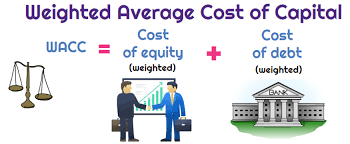What is WACC in Valuation?

WACC stands for Weighted Average Cost of Capital, which is a financial metric used to determine the cost of capital for a company. The WACC takes into account the cost of both debt and equity financing, as well as the proportion of each that a company uses to fund its operations.
The formula for calculating WACC is as follows:
WACC = (E/V x Re) + (D/V x Rd x (1 – Tc))
Where:
E = Market value of the company’s equity
D = Market value of the company’s debt
V = Total value of the company (E + D)
Re = Cost of equity
Rd = Cost of debt
Tc = Corporate tax rate
Now we established that WACC is an important factor to consider when determining the value of a company. It is essentially the minimum rate of return that a company must earn on its investments in order to satisfy its investors and lenders.
It is important to note that the WACC is not a fixed value, and can change over time depending on various factors such as changes in the cost of debt or equity, changes in the company’s capital structure, or changes in the corporate tax rate. As such, it’s important for companies to regularly reassess their WACC and adjust their investment decisions accordingly.
Additionally, the WACC is not without its limitations. It assumes that the capital structure of a company remains constant, which may not always be the case in practice. It also assumes that the risk of the company’s debt and equity are perfectly correlated, which may not always be true. Nonetheless, the WACC remains a useful tool for valuing companies and making investment decisions, and is widely used by analysts and investors around the world.
How to tell if a company is overvalued or undervalued using WACC?
When valuing a company, valuers use the WACC as the discount rate for future cash flows. This means that they calculate the present value of a company’s expected cash flows by discounting them using the WACC. If a company’s expected cash flows are greater than the present value of those cash flows discounted at the WACC, then the company is considered undervalued. On the other hand, if a company’s expected cash flows are less than the present value of those cash flows discounted at the WACC, then the company is considered overvalued.
Case Study of WACC in Valuation
Let’s take a hypothetical example of a Singaporean company called ABC Ltd. ABC Ltd. is a manufacturer of high-tech electronics and has a market capitalization of SGD 1 billion. The company’s capital structure consists of 70% equity and 30% debt. The cost of equity is estimated to be 10%, and the cost of debt is 5%. The corporate tax rate in Singapore is 17%.
To calculate the WACC for ABC Ltd., we can use the formula: WACC = (E/V x Re) + (D/V x Rd x (1 – Tc)) = (0.7 x 0.10) + (0.3 x 0.05 x (1-0.17)) = 0.087, or 8.7%
Now, let’s say that ABC Ltd. is planning to invest in a new production facility that is expected to generate SGD 200 million in cash flows each year for the next five years. To determine the value of this investment, we can calculate the present value of these cash flows using the WACC as the discount rate.
The present value of the cash flows would be:
PV = (CF1 / (1 + WACC)^1) + (CF2 / (1 + WACC)^2) + … + (CF5 / (1 + WACC)^5) = (200 / (1 + 0.087)^1) + (200 / (1 + 0.087)^2) + … + (200 / (1 + 0.087)^5) = SGD 811 million
If the cost of the investment is less than SGD 811 million, then it would be a good investment for ABC Ltd. On the other hand, if the cost of the investment is more than SGD 811 million, then it would not be a good investment.
Summary of WACC
So, in summary, the WACC is a key factor to consider when valuing a company and making investment decisions. By using the WACC as the discount rate for future cash flows, valuers, investors, owners, analysts can determine whether a company is undervalued or overvalued, and whether an investment opportunity is worth pursuing. This information is useful for making decisions about capital budgeting, project valuation, and investment opportunities.
If you would like to know more, read this article on discount rate in valuation or speak with a valuer for a free consultation today.
